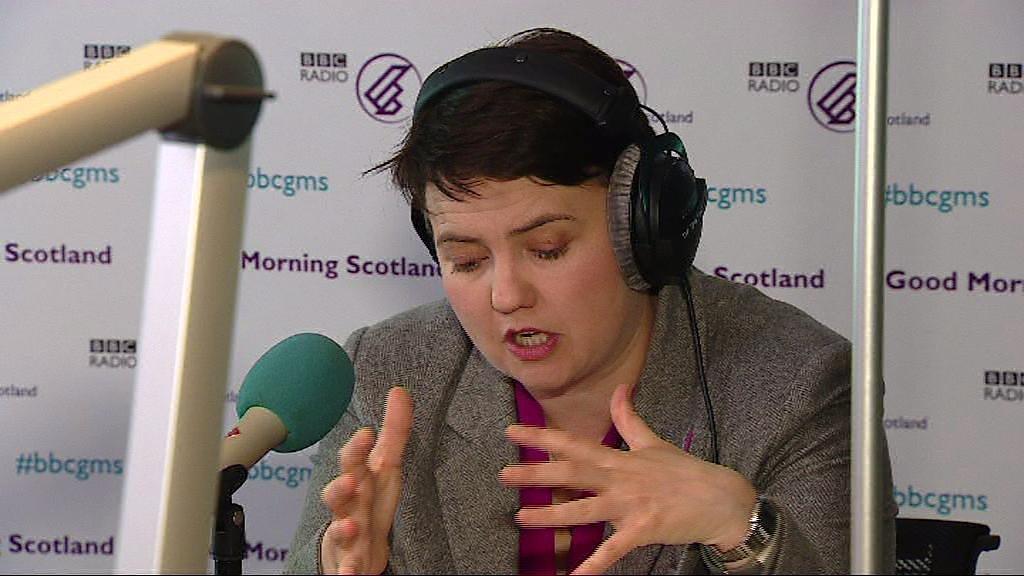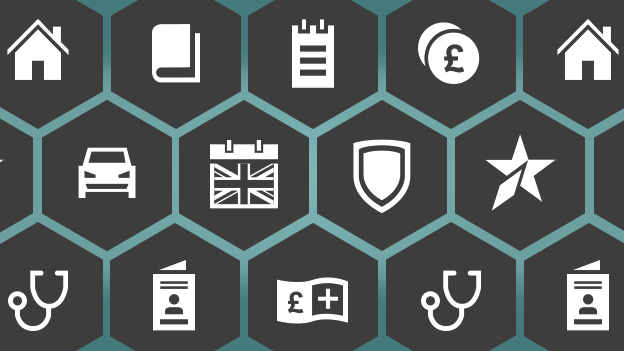Election 2017: Davidson says immigrants find Scotland 'unattractive'
- Published
Ruth Davidson said Scotland needed to have an economy that was attractive
Scottish Conservative leader Ruth Davidson said there were issues around why Scotland appeared to be "uniquely unattractive" to immigrants.
She told BBC Radio's Good Morning Scotland programme that being the "highest taxed part" of the UK disadvantaged the country.
Ms Davidson said she believed there was a need for a better immigration system.
The Conservative Party's General Election manifesto pledged to cut net migration to "tens of thousands".
Campaigning for the 8 June vote resumed on Friday after being halted because of the terrorist attack in Manchester on Monday night.
Twenty-two people were killed, including schoolgirl Eilidh MacLeod from Scotland, and almost 60 people were badly injured.
Ms Davidson, who is the last of Scotland's main political leaders to be interviewed on Good Morning Scotland, said it had been right to "pause" campaigning.
But she added that it was also right to resume because "the people who are doing the attacks, they don't like our freedoms".
On the issue of people coming to the UK to work, the MSP said she was not "hung up on numbers".
Ms Davidson explained: "Whether it is one person under 100,000 or one person over - to me that is less than an issue.
"It is about making sure that we have a system that works and that we do have to have a conversation, particularly when it comes to the other 27 EU nations about how we do that, so it is fair, so it is transparent, so the public can have confidence in it.
"I don't think there is anything anti-immigrant or racist about saying we need to have a system that people can believe in."
The politician said that one of the things that worried her was that "for all the people that come to the UK, a very, very small proportion choose to come to Scotland".
Ms Davidson added: "There is an issue about why is Scotland so uniquely unattractive to people that come to the UK, or it would seem to be from the figures.
"I have my own theories about this in terms of the fact that we are the highest taxed part of the UK, the fact that we have an economy that is shrinking not growing when the rest of the UK economy is growing.
"I think we need to be more pro-business - when people move to other countries it is so they can work and get on and have a better quality of life.
"We need to have an economy that attracts more people that come to the UK, within the UK."

What have Scotland's leaders been saying?
In a series of interviews on BBC Radio Scotland's Good Morning Scotland programme, each main party leader made their campaign pitch ahead of the 8 June election.
Nicola Sturgeon - Scottish National Party
Nicola Sturgeon says a vote for the SNP would strengthen her hand in the Brexit negotiations
Nicola Sturgeon has said a vote for the SNP would strengthen Scotland's hand over Brexit and allow her to argue for a seat at the negotiating table. The Scottish government wants Scotland to remain in the EU - and in particular the single market. Ms Sturgeon told the BBC: "What I am saying in this election is that we have an opportunity, by how we vote, to give those proposals democratic legitimacy. And, by voting for the SNP, to give me the ability to strengthen Scotland's hands in those [Brexit] negotiations, get a seat at the negotiating table and argue for Scotland's place in the single market."
Kezia Dugdale - Scottish Labour
Kezia Dugdale says the general election will be a success for Labour despite claims from Unite leader Len McCluskey
The leader of Scottish Labour, Kezia Dugdale, has insisted that she thinks her party can win next month's general election. She said people across Scotland were tired of politics in Scotland being dominated by the constitution. She told the BBC: "What I am saying clearly is that with Labour you get a clear promise of opposition to independence and an independence referendum."
Willie Rennie - Scottish Liberal Democrats
Willie Rennie says his party's wish to hold a vote on any Brexit deal does not conflict with its refusal to have a second vote on Scottish independence
There is no inconsistency in supporting a second referendum on Brexit but not on independence, the Scottish Lib Dem leader Willie Rennie has said. The Liberal Democrat manifesto says UK voters should be offered a vote on the final deal to leave the EU. But the party is firmly opposed to another referendum on whether Scotland should be independent. Mr Rennie told the BBC: "I think the British people, not just Theresa May, not just the MPs, not just the Conservatives, should decide on whether that deal is good enough or not."
- Published26 May 2017

- Published5 June 2017
